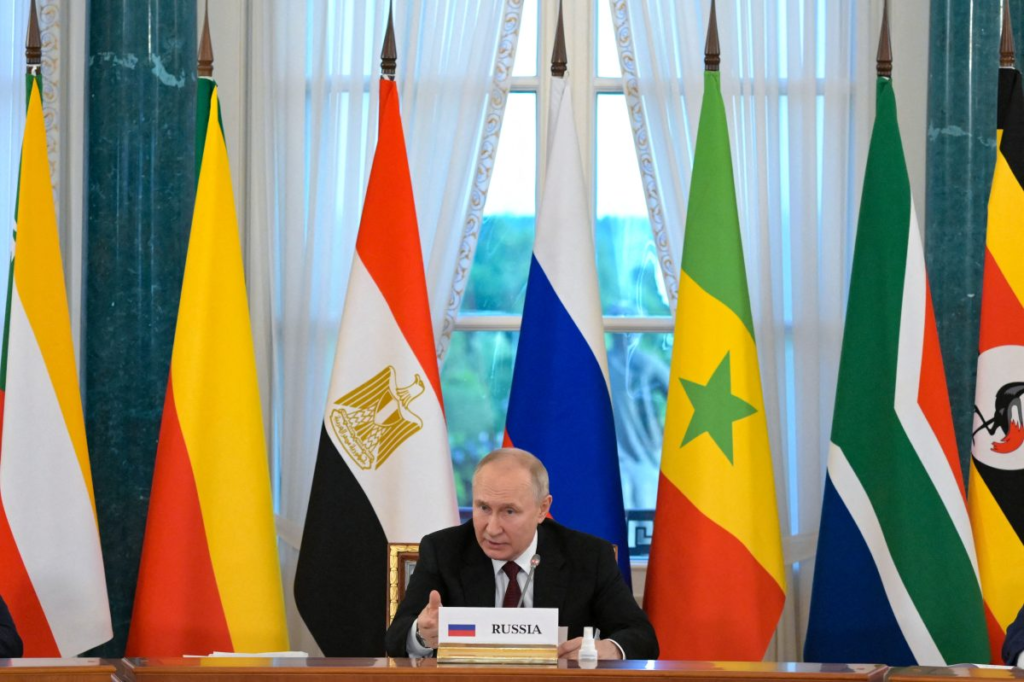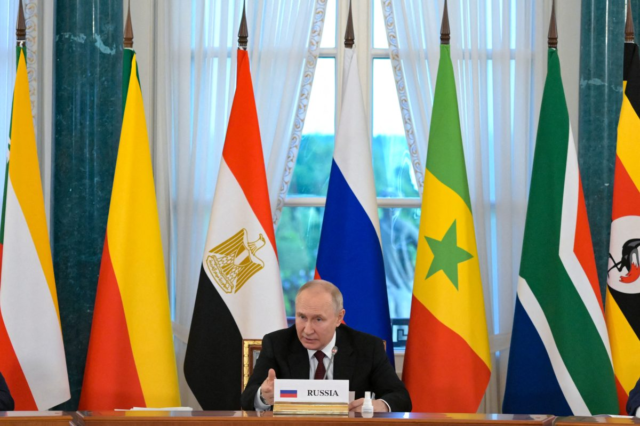Vladimir Putin accuses the West of “shamelessly” exploiting the Black Sea grain deal and says Russia can replace Ukrainian grain both on a commercial and free of charge basis.

President Vladimir Putin of Russia has pledged to supply free grain to Africa and expressed his confidence that trade turnover between his country and the continent will grow from the $18bn it reached in 2022.
In an article published on Monday ahead of the Russia Africa Summit in St Petersburg on 27-28 July he also expressed his support for African inclusion in the G20 and on the UN Security Council.
Russia will ‘replace Ukrainian grain’
In the article, which was published on Monday, President Putin defended his actions in withdrawing from the Black Sea grain deal. Under the deal, Russia had eased its blockade of Ukrainian ports, allowing the East European country to export grain, oilseed and fertiliser to markets around the world over the past year.
When he announced his decision to withdraw in June it prompted global concern over the impacts on food security. The deal expired on 18 July and according to UK security sources, the Russia Black Sea Fleet is now preparing to blockade Ukraine’s ports again.
In his article, Putin denounced the deal, saying that it had been “shamelessly used solely for the enrichment of large US and European businesses”, with over 70% of the supplies exported from Ukraine ending up in high and upper-middle income countries and little going to those most in need.
He also said that none of the provisions of the deal relating to exemption from sanctions of Russian grain and fertiliser exports had been fulfilled, and claimed that the deal’s humanitarian purpose had therefore been defeated.
He stressed that Russia has always paid “great attention” to supplies of food to Africa, and that it had exported 11.5m tonnes of grain to the continent in 2022, and almost 10m tonnes more in the first half of 2023, on a contractual and humanitarian basis despite sanctions.
And he added: “I want to give assurances that our country is capable of replacing the Ukrainian grain both on a commercial and free-of-charge basis, especially as we expect another record harvest this year.”
In reaction to the speech, the Washington Post commented that the president was cynically trying to blame the West and “weaponise” food supplies but that “Moscow’s own guilt is evident in the explosions and fires that have devastated Ukrainian grain stores and facilities”.
Trade potential with Africa
In the article, President Putin noted that Russia’s trade turnover with Africa had risen to $18bn in 2022 but that the potential was much higher.
He said that “Russian companies are interested in working more actively on the continent in the sphere of high technologies and geological exploration, in the fuel and energy complex, including nuclear power, in the chemical industry, mining and transport engineering, agriculture and fishery.”
He underlined that Russia is attaching “great importance” to the second Russia-Africa Summit and Economic and Humanitarian Forum taking place in St Petersburg on Thursday and Friday. The event is designed to promote trade and cooperation between Russia and the continent and includes a programme of over 30 panel discussions and thematic events organised around business cooperation, security, science and technology and humanitarian and social issues.
Support for Africa joining G20 and UN Security Council
The president also stressed the long history of cooperation with Africa of Russia and its predecessor, the Soviet Union, and claimed that his country had always adhered to the “African solutions to African problems” principle. He said that Russia had stood in solidarity with African countries in their struggles to free themselves from colonial oppression and now welcomed “the rising international authority of individual states as well as Africa as a whole”.
In that light, he said that Russia stands for “granting African countries their rightful place in the structures that determine the world’s fate, including the UN Security Council and the G20, as well as for reforming the global financial and trade institutions in a way that meets their interests.”






